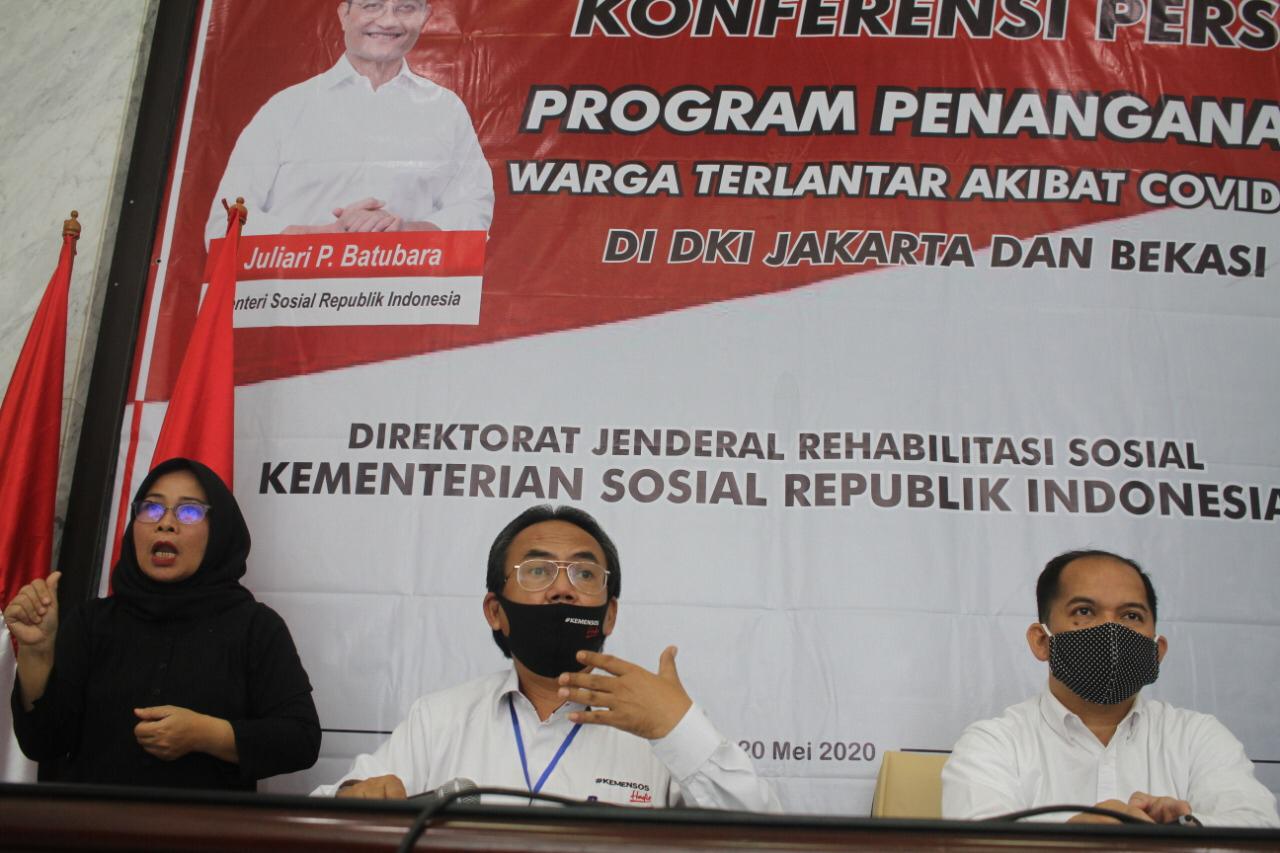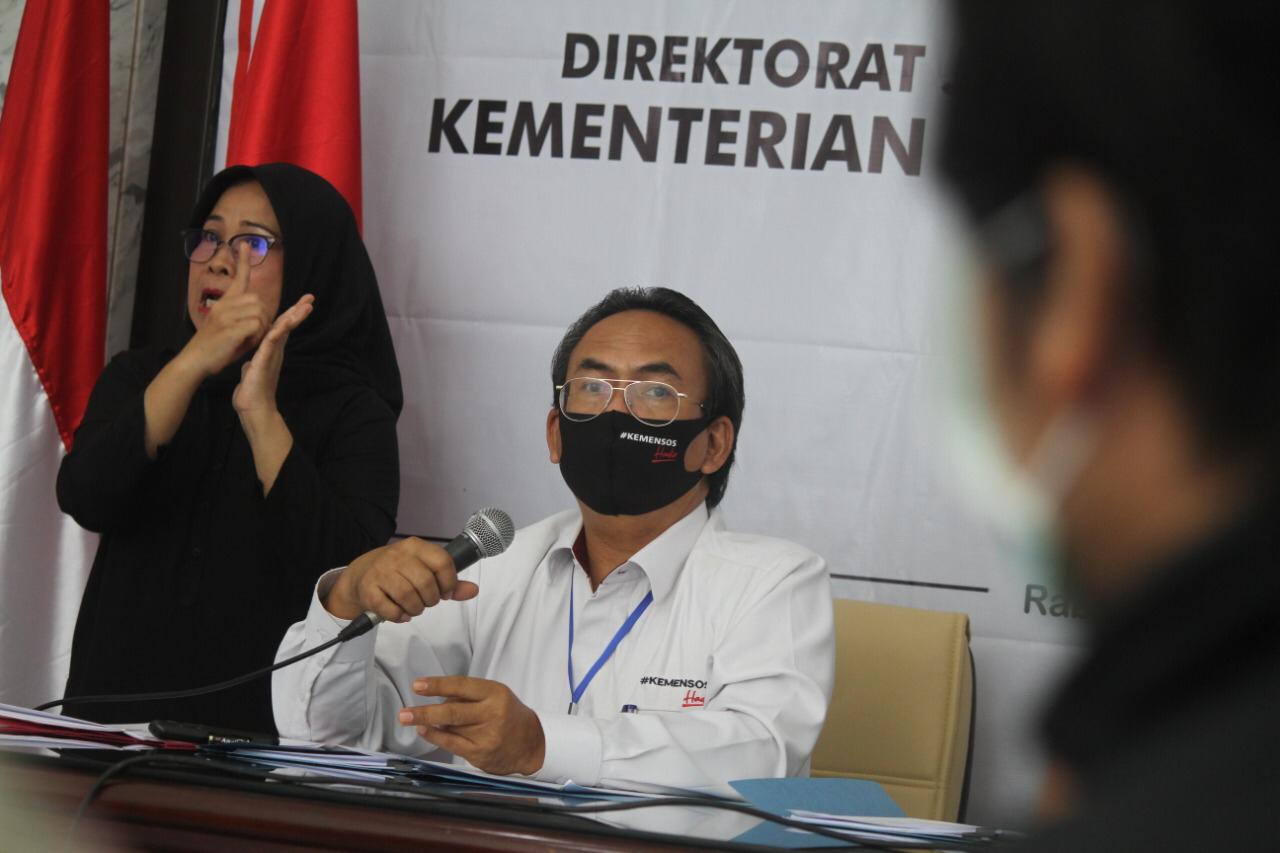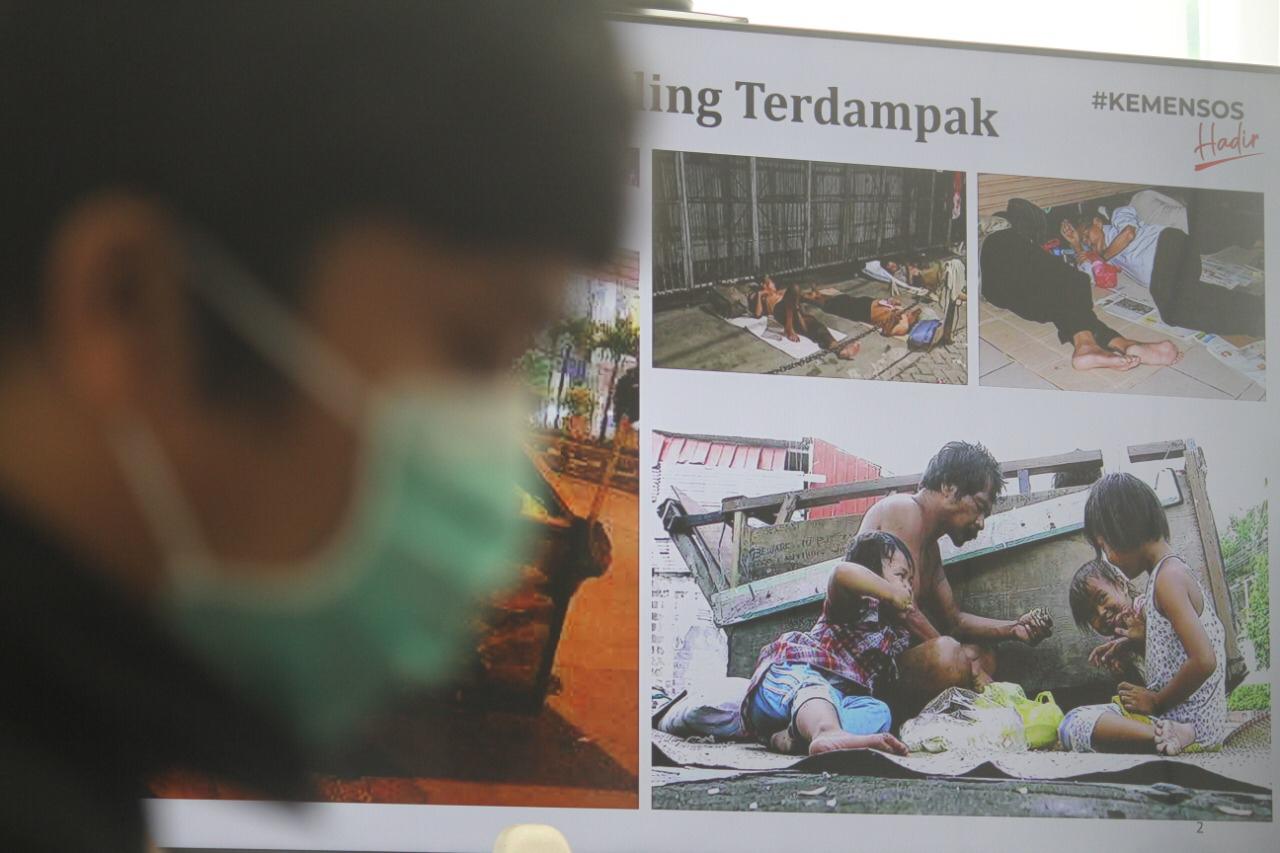JAKARTA (20 May 2020) - The
condition of the COVID-19 pandemic with a curve that is still fluctuating,
coinciding with the moments facing the month of Ramadan and Eid Al-Fitr, the
trend of displaced people has increased. On that basis, the Ministry of Social
Affairs has created a scheme for handling displaced people affected by
COVID-19.
Based on the direction of the
Minister of Social Affairs. Juliari P. Batubara, Directorate General of Social
Rehabilitation was appointed to handle the displaced people. This treatment
aims to pay special attention to the poor, vulnerable and marginalized in order
to survive in the COVID-19 pandemic situation.
Following up on this, the
Directorate General of Social Rehabilitation created a scheme for handling
displaced people with 3 approaches, namely the community approach, the
Temporary Shelters (TPS) approach and the Social Rehabilitation Center
approach.
Integration of Community
Approaches, TPS and Social Rehabilitation Centers. The first is a
community-based approach. This focuses on activities that are carried out
directly in the community. Activities in the form of strengthening families
affected by COVID-19, education about the dangers of COVID-19, how it is spread
and ways to avoid COVID-19.
In a community approach, the
Ministry of Social Affairs collaborates with Social Welfare Institutions that
foster each community. Social Welfare Institutions are an extension of the
Ministry of Social Affairs in conducting educational interventions and social
assistance during the COVID-19 pandemic.
Intervention in communities is
not limited to education so that they do not take to the streets / public
spaces during Large-Scale Social Restrictions (PSBB), but also ensure that they
are able to meet their basic needs during the PSBB by providing social
assistance for basic necessities.
A total of 10 Social Welfare
Institutions that foster marginalized communities were visited by the Director
General of Social Rehabilitation, Harry Hikmat from 6 to 8 May and 12 May 2020.
The livelihoods of residents in the community are very diverse, ranging from
scavengers, beggars, buskers, street children. , hawkers, drivers, garbage
collectors and so on. The Director General of Social Rehabilitation also went
directly to these marginalized communities, ranging from communities under toll
roads, scavengers, street singers, residents along the railroad tracks to
fishing communities.
The Director General of Social
Rehabilitation came down directly to ascertain whether community members could
access social assistance from the Government. On a visit to each of the Social
Welfare Institution-assisted communities, the Director General for Social
Rehabilitation also provided social assistance from the Ministry of Social
Affairs and the care of the Ministry of Social Affairs working partner, Bank
Rakyat Indonesia (BRI) for several neglected residents. Other than that. Also
distributed are medical devices in the form of masks, hand sanitizers and hand
washing soap.
The second approach is the
TPS-based approach. In this approach, the Ministry of Social Affairs is working
with the Provincial Government of DKI Jakarta to provide TPS in the form of a
Sports Hall. The Sports Hall functions to temporarily accommodate displaced
residents as a result of curbing the Public Order Agency on roads / public
spaces.
In this sports hall, they will be
recorded, have their health checked and given food from the soup kitchen. This
public kitchen is managed by the Ministry of Social Affairs' Disaster Alert
Cadets (Tagana) in collaboration with the local Social Service Sub-department.
For those who still have families, the Ministry of Social Affairs will repatriate
them.
Currently the Sports Hall that
has been provided are the Karet Tengsin Sports Hall in Central Jakarta, the
Tanjung Priok Sports Hall in North Jakarta, the Sports Hall for Pasar Minggu
South Jakarta, the Sports Hall for Ciracas in East Jakarta and the Sports Hall
for Cengkareng, West Jakarta. Each Sports Hall has a capacity to accommodate up
to 100 people. So to avoid overcrowding at the TPS, the Ministry of Social
Affairs is also trying to handle it in the Community through Social Welfare
Institutions.
The third approach is an approach
based on the Social Rehabilitation Center. This approach is the last alternative
as a reference for Sports Hall in DKI Jakarta which requires special handling.
This service is prioritized for vulnerable groups such as children, pregnant
women, elderly and people with disabilities.
Several centers in the Jakarta
and Bekasi areas were used as TPS. These are the Jakarta "Mulya Jaya"
Hall, the Jakarta "Melati" Hall, the Bekasi "Tan Miyat"
Hall, the Bekasi "Budhi Dharma" Hall and the Bekasi "Pangudi
Luhur" Hall.
Cumulative details are based on
daily reports as of 19 May 2020, there were 1,646 PMs who have been served at
the Sports Hall, 195 PMs who have been served at the Social Rehabilitation
Center and 2,162 PMs who are in the community. Meanwhile, the cumulative data
are PM By Name By Address (BNBA) as of May 19 In 2020, there were 1,368 PM who
had been served at the Sports Hall, 192 PM who had been served at the Social
Rehabilitation Center and 2,102 PM who were in the community.
The Ministry of Social Affairs
through the Directorate General of Social Rehabilitation also distributed basic
food assistance to communities and the Social Rehabilitation Center as visited
TPS. A total of 1,080 basic food packages have been distributed, with details
of 374 basic food packages from the Directorate General of Social Protection
and Security of the Ministry of Social Affairs and 706 basic food packages from
BRI which is a working partner of the Ministry of Social Affairs of the Republic
of Indonesia.
In addition to the basic food
packages, the Ministry of Social Affairs also provides medical equipment
assistance for TPS at Sports Hall and Social Rehabilitation Centers in Jakarta
and Bekasi. The medical equipment consists of 410 liters of disinfectant, 15
units of disinfectant sprayer, 3,667 bottles of 250 ml hand soap, 1,099 mask
boxes, 4,637 bottles of 500 ml hand sanitizers, 2,109 bottles of 60 ml hand
sanitizers and 799 boxes of gloves.
Of all the approaches to handling
displaced people, of course the synergy among parties is an important point and
determines the success of the program. The hope is that none of the residents
are neglected, all must receive treatment according to the mandate of the
Minister of Social Affairs.
The Directorate General of Social
Rehabilitation is one of the work units of the Ministry of Social Affairs which
deals with the problems of children, persons with disabilities, the elderly,
victims of drug abuse as well as persons with social deviance issues and victims
of trafficking in persons. This is what is commonly called the 5 Social
Rehabilitation clusters.
The Directorate General of Social
Rehabilitation has moved quickly to respond the impact of the COVID-19 Pandemic
for 5 Social Rehabilitation clusters. Since 4 April 2020, social assistance has
been distributed to 5 Social Rehabilitation clusters through Social Welfare
Institutions. A total of 19,303 social assistance packages have been provided
for children, both at Social Welfare Institutions and the Child Social
Rehabilitation Centers.
In addition, 297,239 packages of
basic food assistance and cash assistance have been provided to persons with
disabilities through Social Welfare Institutions, Social Rehabilitation Centers
for Persons with Disabilities and Disabled Persons Organizations (OPD). This
amount also includes the President's social assistance channeled through the
Association of State-Owned Banks (Himbara) and PT. POS Indonesia.
For the elderly cluster,
1,292,530 packages of basic food assistance and cash assistance were
distributed through Social Welfare Institutions and the Center for Elderly
Social Rehabilitation. Similar to persons with disabilities, the amount of
assistance in this cluster also includes the President's social assistance, which
is channeled through the Association of State-Owned Banks (Himbara) and PT. POS
Indonesia.
Meanwhile, the cluster of victims
of drug abuse, 21,092 social assistance packages, as well as the cluster of
persons with social deviance issues and
human trafficking victims, totaling 509 social assistance packages were
distributed through Social Welfare Institutions.
This social assistance is a quick
response from the Ministry of Social Affairs through the Directorate General of
Social Rehabilitation in meeting the basic needs of Beneficiaries in 5 Social
Rehabilitation Clusters. So that they are especially able
to survive the conditions of the COVID-19 pandemic. The Ministry of Social
Affairs hopes for the support of all elements of society in handling the impact
of COVID-19 for vulnerable groups in 5 Social Rehabilitation Clusters as well
as in displaced communities.
 English
English
 Bahasa
Bahasa



